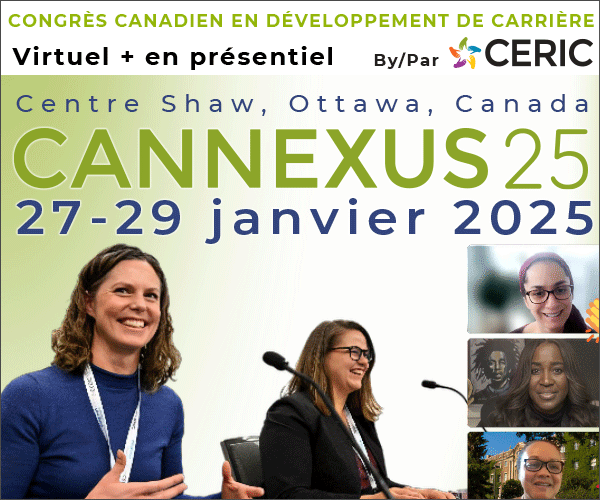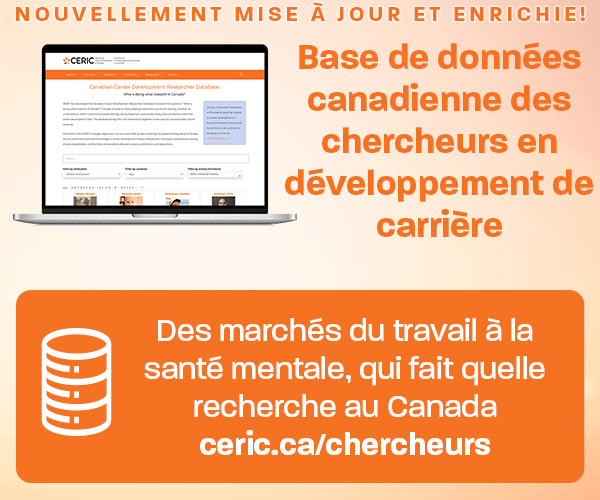Un modèle théorique pour les antécédents des engagements en matière d’objectifs de formation
Mots-clés :
modèle théorique, antécédents, objectif éducatif, engagementRésumé
The transition from high school to college is a key point in students’ educational route. During this transition, the ability to formulate an educational goal and the will to actively engage with this goal are assumed to lead to favorable academic outcomes. However, students differ in their commitment to their educational goal, which may translate into differences in goal implementation. How can we explain such differences? A theoretical model of the factors influencing students’ commitment to their educational goal is proposed. This model is composed of two proximal antecedents—goal importance and expectancy of goal achievement—and two distal antecedents—goal abstraction and goal integration. The proximal antecedents are mainly based on the expectancy-value framework (Eccles & Wigfield, 2002), and the distal antecedents on the assumptions relative to the hierarchical goal structure (Carver & Scheier, 1998).
Références
Ajzen, I. (1991). The theory of planned behavior. Organizational Behavior and Human Decision Processes, 50, 179–211.
Ajzen, I., Brown, T. C., & Carvajal, F. (2004). Explaining the discrepancy between intentions and actions: The case of hypothetical bias in contingent valuation. Personality and Social Psychology Bulletin, 30, 1108–1121.
Ames, C. (1992). Classrooms: Goals, structures, and student motivation. Journal of Educational Psychology, 84(3), 261–271.
Austin, J. T., & Vancouver, J. B. (1996). Goal constructs in psychology: structure, process and content. Psychological Bulletin, 120(3), 338–375.
Bandura, A. (1986). Social foundations of thought and action: A social cognitive theory. New Jersey: Prentice Hall.
Bay, D., & Daniel, H. (2003). The theory of trying and goal directed behaviour: The effect of moving up the hierarchy of goals. Psychology and Marketing, 20(8), 669–684.
Boudrenghien, G., Frenay, M., & Bourgeois, E. (2011). La transition de l’enseignement secondaire vers l’enseignement supérieur: Rôle des représentations et
motivations à l’égard de son projet de formation [The transition from high-school to college education: Role of representations and motivations towards one’s
educational goal]. L’Orientation Scolaire et Professionnelle, 40(2), 125– 155.
Boudrenghien, G., Frenay, M., Bourgeois, E., Karabenick, S. A., & Eccles, J. S. (submitted). Antecedents of educational goal commitment: An experimental
investigation of the role of goal abstraction, integration, and importance.
Brunstein, J. C. (1993). Personal goals and subjective wellbeing: A longitudinal study. Journal of Personality and Social Psychology, 65(5), 1061–1070.
Brunstein, J. C., & Gollwitzer, P. M. (1996). Effects of failure on subsequent performance: The importance of self defining goals. Journal of Personality and Social
Psychology, 70(2), 395–407.
Carver, C. S., & Scheier, M. F. (1998). On the self-regulation of behavior. Cambridge: Cambridge University Press.
Downie, M., Koestner, R., Horberg, E., & Haga, S. (2006). Exploring the relation of independent and interdependent self-construals to why and how people pursue
personal goals. The Journal of Social Psychology, 146(5), 517–531.
Durik, A. M., Vida, M. N., & Eccles, J. S. (2006). Task values and ability beliefs as predictors of high school literacy choices: A developmental analysis. Journal of Educational Psychology, 98(2), 382–393.
Eccles, J. S., Barber, B., & Jozefowicz, D. (1999). Linking gender to education, occupation, and recreational choices: Applying the Eccles et al. model of achievement related choices. In W. B. Swann, J. H. Langlois, & L. A. Gilbert (Eds.), Sexism and stereotypes in modern society: The gender science of Janet Taylor Spence (pp. 153–192). Washington, DC: APA Press.
Eccles, J. S., Vida, M. N., & Barber, B. L. (2004). The relation of early adolescents’ college plans and both academic ability and task value beliefs to subsequent college enrollment. Journal of Early Adolescence, 24(1), 63–77.
Eccles, J. S., & Wigfield, A. (2002). Motivational beliefs, values, and goals. Annual Review of Psychology, 53,109–132
Eccles, J. S., Wigfield, A., & Schiefele, U. (1998). Motivation to succeed. In W. Damon & N. Eisenberg (Eds.), Handbook of child psychology: Vol. 3. Social, emotional and personality development (pp. 1017–1095). New York: Willey.
Eccles-Parsons, J. S., Adler, T. F., Futterman, R., Goff, S. B., Kaczala, C. M., Meece, J. L., & Midgley, C. (1983). Expectancies, values, and academic behaviors. In J. T.
Spence (Ed.), Achievement and achievement motivation (pp. 75–146). San Francisco, CA: W. H. Freeman.
Emmons, R. A. (1992). Abstract versus concrete goals: Personal striving level, physical illness, and psychological well-being. Journal of Personality and Social Psychology, 62(2),292–300.
Gerdes, H., & Mallinckrodt, B. (1994). Emotional, social, and academic adjustment of college students: A longitudinal study of retention. Journal of Counseling and
Development, 72(3), 281–288.
Germeijs, V., & Verschueren, K. (2006). High school students’ career decision-making process: A longitudinal study of one choice. Journal of Vocational Behavior, 68(2), 189–204.
Germeijs, V., & Verschueren, K. (2007). High school students’ career decision-making process: Consequences for choice implementation in higher education. Journal of Vocational Behavior, 70(2), 223–241.
Harackiewicz, J. M., Barron, K. E., & Elliot, A. J. (1998). Rethinking achievement goals: When are they adaptive for college students and why? Educational Psychologist,
(1), 1–21.
Hirschi, A., & Vondracek, F. W. (2009). Adaptation of career goals to self and opportunities in early adolescence. Journal of Vocational Behavior, 75, 120–128.
Hollenbeck, J. R., & Klein, H. J. (1987). Goal commitment and the goal-setting process: Problems, prospects, and proposals for future research. Journal of Applied
Psychology, 72(2), 212–220.
Husman, J., & Lens, W. (1999). The role of the future in student motivation. Educational Psychologist, 34(2), 113–125.
Klinger, E., Barta, S. G., & Maxeiner, M. E. (1980). Motivational correlates of thought content frequency and commitment. Journal of Personality and Social Psychology, 39(6), 1222-1237. doi: 10.1037/h0077724
Lawson, R. (1997). Consumer decision making within a goaldriven framework. Psychology and Marketing, 14(5), 427– 449.
Lent, R. W., Brown, S. D., & Hackett, G. (1994). Toward a unifying social cognitive theory of career and academic interest, choice, and performance. Journal of
Vocational Behavior, 45(1), 79–122.
Locke, E. A., & Latham, G. P. (1990). A theory of goal setting and task performance. Englewood Cliffs, NJ: Prentice-Hall.
Locke, E. A., & Latham, G. P. (2002). Building a practically useful theory of goal setting and task motivation: A 35-year odyssey. American Psychologist, 57(9), 705–717.
McGregor, H. A., & Elliot, A. J. (2002). Achievement goals as predictors of achievement relevant processes prior to task engagement. Journal of Educational Psychology, 94(2), 381–395.
Meece, J. L., Eccles-Parsons, J. S., Kaczala, C. M., Goff, S. B., & Futterman, R. (1982). Sex differences in math achievement: Toward a model of academic choice. Psychological Bulletin, 91(2), 324–348.
Miller, R. B., & Brickman, S. J. (2004). A model of future oriented motivation and self regulation. Educational Psychology Review, 16(1), 9–33.
Neuville, S., Frenay, M., Schmitz, J., Boudrenghien, G., Noël, B., & Wertz, V. (2007). Tinto’s theoretical perspective and expectancy-value paradigm: A confrontation to
explain freshmen’s academic achievement. Psychologica Belgica, 47(1–2), 31–50.
Osipow, S. H. (1999). Assessing career indecision. Journal of Vocational Behavior, 55, 147–154.
Pascarella, E. T., & Terenzini, P. T. (1980). Predicting freshmen persistence and voluntary dropout decisions from a theoretical model. Journal of Higher Education, 51(1), 60–75.
Pizzolato, J. E. (2006). Achieving college student possible selves: Navigating the space between commitment and achievement of long-term identity goals. Cultural
Diversity and Ethnic Minority Psychology, 12(1), 57–69.
Pomerantz, E. M., Saxon, J. L., & Oishi, S. (2000). The psychological trade-offs of goal investment. Journal of Personality and Social Psychology, 79(4), 617–630.
Richardson, M. S., Meade, P., Rosbruch, N., Vescio, C., Price, L., & Cordero, A. (2009). Intentional and identity processes: A social constructionist investigation
using student journals. Journal of Vocational Behavior, 74, 63–74.
Schultz, P. A. L. (1997). Educational goals, strategiesuse and the academic performance of high school students. High School Journal, 80(3), 193–201.
Schunk, D. H. (1990). Goal setting and self-efficacy during self-regulated learning. Educational Psychologist, 25(1), 71–86.
Sheldon, K. M., & Emmons, R. A. (1995). Comparing differentiation and integration within personal goal systems. Personality and Individual Differences, 18(1), 39–46.
Sheldon, K. M., & Kasser, T. (1995). Coherence and congruence: Two aspects of personality integration. Journal of Personality and Social Psychology, 68(3), 531–543.
Sideridis, G. D. (2001). The causal role of goal importance for the explanation of student study behaviour: Cross validation with multiple samples. Educational
Psychology, 21(3), 277–298.
Tabachnick, S. E., Miller, R. B., & Relyea, G. E. (2008). The relationships among students’ future oriented goals and subgoals, perceived task instrumentality, and task oriented self-regulation strategies in an academic environment. Journal of Educational Psychology, 100(3), 629–642.
Tinto, V. (1993). Leaving college: Rethinking the causes and cures of student attrition. Chicago: University of Chicago Press.
Updegraff, K. A., Eccles, J. S., Barber, B. L., & O’Brien, K.M. (1996). Course enrollment as self-regulatory behavior: Who takes optional high school math courses? Learning and Individual Differences, 8(3), 239–259.
Vallacher, R. R., & Wegner, D. M. (1989). Levels of personal agency: Individual variation in action identification. Journal of Personality and Social Psychology, 57(4), 660–671.
Wentzel, K. R. (1991). Relations between social competence and academic achievement in early adolescence. Child Development, 62(5), 1066–1078.
Wrosch, C., Miller, G. E., Scheier, M. F., & Brun de Pontet, S. (2007). Giving up on unattainable goals: Benefits for health? Personality and Social Psychology Bulletin,
(2), 251–265.
Wrosch, C., Scheier, M. F., Miller, G. E., Schulz, R., & Carver, C. S. (2003). Adaptive self-regulation of unattainable goals: Goal disengagement, goal reengagement, and subjective well-being. Personality and Social Psychology Bulletin, 29(12), 1494–1508.
Zimmerman, B. J. (1989). A social cognitive view of self regulated academic learning. Journal of Educational Psychology, 81(3), 329–339.

Téléchargements
Publié-e
Comment citer
Numéro
Rubrique
Licence

Cette œuvre est sous licence Creative Commons Attribution - Pas d'Utilisation Commerciale - Pas de Modification 4.0 International.











